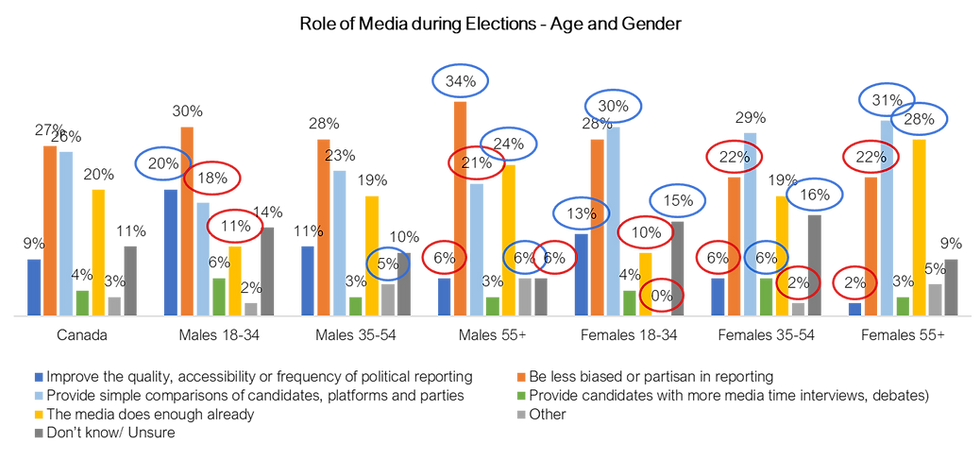Post Election Study
Campaign Research has conducted a national public opinion poll of 2,479 Canadians. Post election (October 21st, 2019), we wanted to take a closer look at the following:
a) How voters mostly felt about the election campaign overall
b) Were voters voting for their preferred choice, or were they voting against a party or leader
c) What policy areas voters were more interested in
d) What medium was a most influential in helping voters decide who to vote for
e) What else could the mainstream media do to help voters during the election campaign
In our recent study, Canadians did not seem to really appreciate the election campaign and about half of them felt being “irritated” or “indifferent” during the election campaign. Only 1 out of 10 people felt optimistic during the campaign.

Voters who felt mostly “irritated” were significantly higher in Atlantic Canada, Ontario and Alberta whereas Quebec voters were significantly higher on feeling “indifferent” but significantly lower (than the rest of Canadians) on feeling “irritated” about the election campaign. All voters across all provinces outside of Quebec broke down roughly the same way.

We also learn that about one quarter of Canadians claim to have voted against a political party or its leader compared to 2/3rd’s of voters who claim to have voted for the party or leader that they supported. Voter turnout seemed to be lower among millennials.

While nearly 1/3rd of all eligible voters did not vote, our survey results only capture about 7% of Canadians who are willing to openly claim that they didn’t vote in this last election. “Don’t like politics” and/or “don’t trust politicians” were the main reasons listed for not voting.

Overall, Canadians want political parties and leaders to formulate their policies to revolve around “cost of living”, “healthcare” and “government accountability”. But the priorities are somewhat different in some of the regions of Canada.

Quebec voters focused more on government spending/ accountability and healthcare. In Saskatchewan and Alberta, creating jobs, economic growth and supporting businesses was the more of a priority.

Television is recognized as the medium that was the most valuable in helping voters decide who to vote for. It is also significantly higher among baby boomers, but also the most used for all genders and ages.

As for the role of the mainstream media and their role to educate voters on the Candidates and Parties, 27% of respondents believed that media should be “less biased or partisan” and instead “provide simple comparisons about the party platforms” to the public. Males more strongly feel that the media should be less biased whereas females more strongly felt that the media should do more to explain the party platforms.

Two-thirds of voters claim that they would have voted online, if given the opportunity. Although, baby boomers are somewhat less likely to vote online, over half of them claim that they would.

METHODOLOGY
This study was conducted by Campaign Research between November 8th and November 10th, 2019 through an online survey of 2,479 randomly selected Canadian adults who are members of Maru/Blue’s online panel Maru Voice Canada and were provided with various incentives to respond. The panelists were selected to reflect Canada’s age, gender and regional distributions in line with 2016 Statistics Canada census data. For comparison purposes, a probability sample of this size has an estimated margin of error (which measures sampling variability) of +/- 1.9%, 19 times out of 20.
The results have been weighted by age, gender, and region (and in Quebec, language) to match the population according to 2016 Census data. Certain areas or groups may be oversampled but have been weighted to reflect their proportion of Canada’s population. This is to ensure the sample is representative of the entire adult population of Canada. Discrepancies in or between totals are due to rounding.
The following screening question was asked in order to determine eligibility for participation in the study
"Are you 18 years of age or older and eligible to vote in federal elections?"










Commentaires